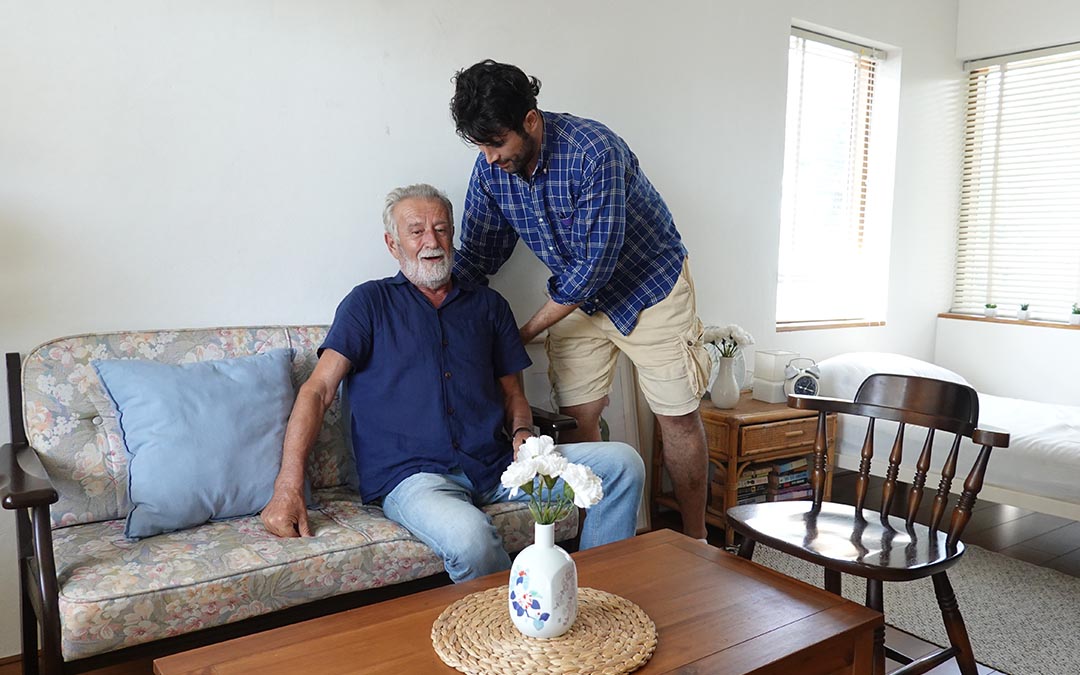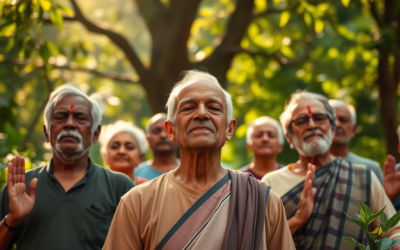In case you thought parenting was tough, wait till you reach the age where you need to parent your parents! At Least in the case of kids it can be your way or the highway but in case of parents, they have a mind of their own and know how to get their way. It can take the form of non co-operation or emotional black mail or just being stubborn.Now to this you add a twist- when you need to parent your in-laws. It can really get tough.
When it comes to parenting your parents, I don’t think anyone has been able to crack and standardise a formula. Here are some thoughts which might help in bringing a perspective for everyone to ponder on how the parent-children relationship pans out when the role reversal happens.With life expectancy on the rise from around 50 in the 1980s to 70+ now and expected to continue to rise, dealing with ageing but active parents is going to become the next big challenge for the current millennial generation.
Growing up years
In old times, parents passed school without Google, but as caretakers had the wisdom to harp on the formula of study hard, work hard and you will succeed. In those times, this formula worked, as India was a growing economy and parents were the quiet heroes as children who followed their parent’s formula invariably succeeded in landing up a stable job. Children reciprocated by reaching out to take care of their post retirement parents as a quid pro quo wherein the parents invested the majority of their life savings in getting a house in the city and a better education for their children. Given the cost of living in the cities, children preferred to continue to stay with their parents with parents continuing to dole out advice even after their son gets married.
Parenting Parents
As you grow, you need to mature and a time comes for role reversal wherein you come into the shoes of becoming the caregiver for your parents. You need to start parenting your parents. Parents also have their own journey and have a right to live on their own terms – children end up having an issue with this persona of their parents as they want to believe their parents to be the paragon of sacrifice and perfection which is not really the case. At such times, you need to embrace their flaws, quirks, fettish and recognise their sacrifices.
With changing times, the traditional formula of study hard no longer guarantees results. Parents now need to take decisions or calls which may or may not pan out for their children the way they intended them to. Looking back, some of the decisions might seem to be wrong, even though they might have been right under the then prevailing circumstances. For example, I’m aware of some instances wherein parents have enrolled two out of the three siblings in marathi medium school while an english medium school was preferred when it came to the youngest sibling. In this case, the 2 siblings can either hold a grudge against their parents for the preferential treatment given to the youngest sibling or decide to graciously accept it as that’s the best that their parent could have done for them and move on. Or take other instance wherein the parent insisted on their son becoming a CA or an Engineer while he had other interests. Or one wherein the son marries someone against the wishes of the parents but yet when it comes to old age, they look up to him/ his family to be the caregivers.

You need to overcome any negativity for some decisions that might have been taken on your behalf in the past but which may not have panned out to your liking, even though those might have been the best option for you then. Is it easy ? Certainly not. But remember that’s what they did for you when you were growing up. Perfect definition of perfect parents is still WIP
Children need to mature and realise that they cannot stereotype their parents, as no one , including their parents, is unidimensional. They too need to have freedom to be irrational. When ever pointed out about this, they very rarely end up agreeing to it, as they end up rationalising their irrational choices. In case you continue to disagree with them, they end up doing silent protests since even though they have aged, their mind is still young and seeks independence , freedom to do whatever they feel is right. They need their children to be around as caregivers but on their terms since they don’t wish to lose their independence. This makes the situation for their children very tricky to handle.

As parents get older they behave like children – when they want something done they keep on pestering till they get their way; they get cranky when you are watching something else on TV and it’s time for their sitcom/daily soap (sitcom = situational comedy; since in the US in their early days, sitcoms were sponsored by Soap companies, these also came to be known as daily soaps).
In the case of some of the parents things that lead to blow ups are fussing over food / dietary habits leading to irritation or cheeky leg pulling tiffs between the parents.
Parents also have their vulnerabilities, fears and insecurities. These have become very apparent in the current dystopian times of COVID wherein their independence has been constrained and they have been made to depend on their children as caregivers. In the case of parents, who are well educated, living life fiercely independently on their own terms and also have been very active world travellers, the restraint during the lockdown has lead to a feeling of anger/ despair as simple things of daily routine like enjoy morning walk to the garden, or the Sunday morning drive downs to the beach for walks or weekly eat outs etc all of which have been clamped during lockdown, leaving a feeling of being imprisoned. As a result, it is revealing a new rebellious side as some of them look for excuses like stepping out to go to the ATM to withdraw money or buy newspaper or order from Dominos even though knowing fully well that these risks can invite trouble not realising that the outcome can not only be fatal to them but also disastrous to other caregivers living with them.
In today’s changing times, as parents grow old, on retirement, in their second innings, they are pursuing their passion as a hobby or applying their wisdom and knowledge for social good or are even reinventing themselves to adapt to the changing digital times. For e.g during COVID lockdown, my mother in law who has been always used to reading the newspaper the old fashioned way, was quick to adapt to reading it on her mobile via Whatsapp link. Parents want their children to move away from breathing down their neck to more of a virtual parenting from a distance.They want the freedom to live life on their terms and want their children to be available only in case of any eventuality. They want to spend more time with their grandchildren as in such situations they still rule the roost. Grandchildren pampering becomes their favourite hobby as they try to do things for them that they could not do for their own kids since either they were too busy or did not have the resources then.
The challenges that children face in this transition are many. For example when one has siblings, it becomes very tricky for them to make decisions for their parents. This is more so when other siblings have settled far away and only one of the siblings who is around ends up taking the responsibility of being the caregiver. Other siblings who cannot make time many times end up having a view, from a far away distance (usually the comfort of their homes), on decisions being taken by the caregiver sibling. Even though it is said that old age is the second childhood, they do not realise the challenges faced when parents age and continue to assert their independence.
Similarly during the current times with life expectancy on the increase, parents also face a lot of tricky situations. There are instances where the parents after having spent a lot of money on their children’s education and upbringing end up with limited amounts of savings to take care of themselves as the cost of living due to medical expenses post retirement has gone through the roof. This creates further complications when children stay with their parent’s and the property owned by their parents. In such instances, while the parents face a catch-22 situation of having the wealth but sometimes not the liquidity to pay for the costs. This creates an unhealthy tension wherein the parents end up being dependent on their children for the expenses. In such situations, it takes a lot of maturity on the part of the children to realise that the benefits their family is drawing from this arrangement of his parents providing for the house while he provides for the parents living and medical expenses.
Children have a major role to play in the twilight years of their parents and need to learn to find a middle path by either sacrificing some of their ideal aspirations and to work on either logically or emotionally to get buy in/ cooperation from their parents, to get things done. When it comes to decision making on caring for parents, life throws up multiple situations and decisions taken on such occasions may look extremely cruel from the outside, but may end up being the most pragmatic solution, given the conditions.The true test of parenting comes up when one needs to learn to deal with advanced ageing conditions like Alzheimer, arthritis, dementia etc and our parents become fully dependent on us. It’s in these situations our real growth of having lived life so far, gets defined or rather re-defined. Take the case of Alzheimer or dementia, in which parents reach a state of “child-like behaviour”, handling the situation in a way where respect is not compromised, at the same time managing our own life situations, can be highly disruptive.(study this link and you would realise). Or there are instances when due to a critical illness of one of the already handicapped parents, the child at a very young age ends up not only having to become the caregiver but also taking major medical decisions (of course on the advice of the doctors) for the parent. It is at points like these wherein one can’t help but get a feeling of “fact becoming stranger than fiction”. But people find their own ways to overcome these life challenges. I do accept that things can get complicated and challenging when you stay with your parents. But then, a person’s ‘strength of character’ gets defined on how he plays his part by providing for in caring and nurturing the weak and infirm.
As I wind up, let me share a few things to keep in mind – 1) One thing to remember about the generation gap between you and your parents – while you may have all the knowledge of the latest tech and trends, you need to respect that they, having lived longer, they have the wisdom which you can rarely replicate. 2) Since action speaks louder than words, remember your kids are always watching and silently learning from your actions or interactions with your parents. As it is said “You reap as you sow” – How you set an example for them, will decide how they interact with you in your old age.
3) Though you can choose your friends , you can’t choose parents or a family. Just as parents reconcile with you and accept you as you are, (being their progeny), you too need to embrace them as they are and learn to make them comfortable in their twilight years. 4) As it’s only the parent-child relationship that can transcend any other relationship and can create the emotional bond which can rise above any grudge to forgive. Both need to move ahead before it’s too late and you end up regretting for the rest of your life.
Even though some of the aspects mentioned above are easier said than done, you will realise that giving more time to your parents when they need you is the only way you can give back to your parents. As life moves on, remember that someday you too will be parented by your children. Cheers !





